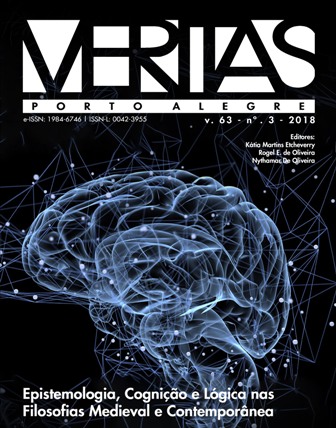A Theory of Five Substances in Marsilio Ficino’s Thought?
DOI:
https://doi.org/10.15448/1984-6746.2018.3.27892Keywords:
Renaissance, hypostasis, Plotinus, Proclus, FicinoAbstract
In this paper I explore the so-called theory of the five substances that has characterized the traditional interpretation of Ficino’s ontology since Kristeller published his book The philosophy of Marsilio Ficino. My point of departure is the first chapter of Book I of his Platonic Theology. I seek to demonstrate that it is not clear that the five hypostasis or degrees of reality can be identified with the term "substance" in Ficino’s text. From the comparison of this chapter with certain passages in his Parmenides’ Commentary, I propose that is more appropriate to describe only the first three hypostasis as "substances". Therefore, the traditional interpretation of Ficino's ontology is not accurate.Downloads
References
Allen, Michael, 1982, “Ficino five substances and the Neoplatonist’s Parmenides”, Journal of the Medieval and Reinassances Studies, vol. 12, n.° 1, pp. 18-45.
Allen, Michael, 2014, "Marsilio Ficino”, en Gersh, Stephen (ed), Interpreting Proclus. From Antiquity to the Renaissance. Cambridge University Press, Cambridge. DOI: https://doi.org/10.1017/CBO9781139014090.022
Anton, Johh, 1977, “ Some Logical Aspects of the Concept of ‘Hypostasis’ in Plotinus”. The Review of Metaphysics, XXXI, 258-71
Ficino, Marsilio, 2001, Platonic Theology, Vol. I. The I Tatti Renaissance Library. London.
d’Hoine, Pieter, 2011, “Aristotle’s Criticism of Non-Substance Forms and its Interpretation by Neoplatonic Commentator”. Phronesis, Volume 56, Issue 3, 262-307. DOI: https://doi.org/10.1163/156852811X575916
Ficino, M. “In Parmenidem”, en Marsilii Ficini philosophi platonici medici atque theologi omnium praestantissimi, Operum. Tomus secundus. Paris : Guillaume Pelé, 1641.
Kristeller, Paul Oskar, 1953, Il pensiero filosófico de Marsilio Ficino”, G.C. Sansoni Editore, Florencia.
Vitale, Enrico, 2011, “Saggio Introduttivo”, Teologia Platonica, Bompiani, Milano.
Saffrey H. D. y Westernik, L.G., 1968, “Introduction” a Proclus, Theologie Platonicienne. Les Belles Letres, Paris.
Downloads
Published
How to Cite
Issue
Section
License
Copyright
The submission of originals to Revista Veritas implies the transfer by the authors of the right for publication. Authors retain copyright and grant the journal right of first publication. If the authors wish to include the same data into another publication, they must cite Revista Veritas as the site of original publication.
Creative Commons License
Except where otherwise specified, material published in this journal is licensed under a Creative Commons Attribution 4.0 International license, which allows unrestricted use, distribution and reproduction in any medium, provided the original publication is correctly cited. Copyright: © 2006-2020 EDIPUCRS</p






